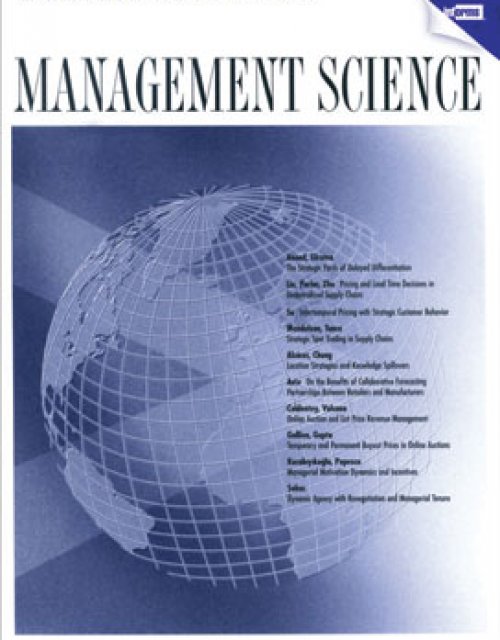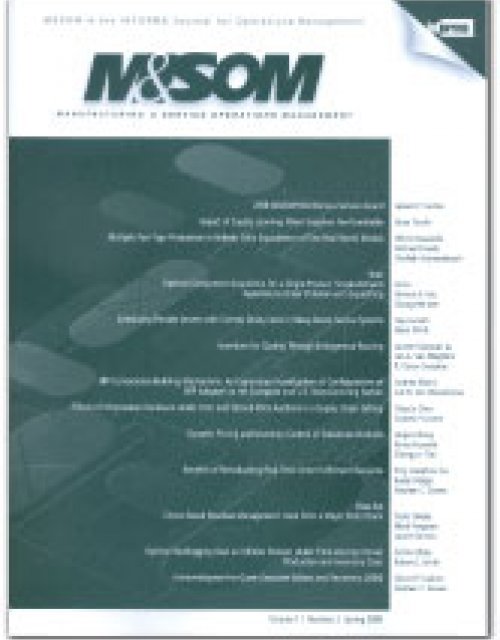Publication records
Subject(s)
Economics, politics and business environment
Volume
62
Journal Pages
6–8
Subject(s)
Technology, R&D management
Keyword(s)
technology partnerships, trust, relational quality
JEL Code(s)
M19
The purpose of this paper is to propose a framework for the monitoring of new technology introduction in a B2B environment. We focus on B2B environments, i.e. on projects where a new technological solution is implemented (and often jointly developed) with a client being either a company or an organization. In such a situation, where a supplier and its client agree to implement a new technology, both are exposed to a risk. The management of these risks can be handled through a couple of approaches: control or trust. The management literature has put a lot of attention on these two modes that play an important role because they drive the quality of the relationship between partners. We will explore their respective roles and build a methodology to monitor them along the life of a buyer-supplier relationship aiming at implementing new technology.
View all ESMT Working Papers in the ESMT Working Paper Series here. ESMT Working Papers are also available via SSRN, RePEc, EconStor, and the German National Library (DNB).
Pages
22
ISSN (Print)
1866–3494
Subject(s)
Marketing
Keyword(s)
ambiguity, brand preference, decisions under uncertainty, multiattribute choice
We propose that ambiguity aversion, as introduced in the literature on decision making under uncertainty, drives a preference for established brands in multiattribute choices among branded alternatives. Established
brands are those for which belief in quality is held with greater confidence, even if specific attributes might be inferior to those of competing, less-established brands. In five experiments, we examine the role of ambiguity aversion in the preference for dominated, established brands. We first show a correlation between ambiguity aversion (revealed through choices among monetary lotteries) and the preference for established brands. We then show that the preference for established brands is enhanced when ambiguity aversion is made more salient in unrelated preceding lottery choices. Thus, ambiguity aversion carries across choices. In addition,
ambiguity aversion and the preference for established brands are both enhanced when subjects anticipate that others will evaluate their lottery choices. Finally, ambiguous information about brand attributes tends to
increase the preference for established brands.
© 2009 INFORMS
Volume
55
Journal Pages
1933–1941
Subject(s)
Marketing
Keyword(s)
emotions, anger, cognitive appraisal, fairness, ultimatum, bargaining
Although previous research has demonstrated the importance of emotions in ultimatum
bargaining, this research provides a more direct, convergent test of the role of anger in
explaining rejections of unfair offers in ultimatum bargaining. First, using appraisal
theory of emotions, this research examines the extent to which the cognitive appraisal of
unfairness leads to the emotion of anger, which in turn, drives punitive behavior (i.e.,
rejection of offers). Second, this research explores the possibility of decoupling the
emotion of anger from its antecedent appraisal of unfairness in order to attenuate
responders' inclination to reject unfair offers. Third, following the current research
tradition that goes beyond a valence-based approach, we differentiate between the negative emotions of anger and sadness and examine whether it is the specific emotion
of anger that is relevant to the cognitive appraisal of unfairness or the general negative
valence of the emotion.
© 2008 John Wiley & Sons, Ltd.
Volume
22
Journal Pages
475–489
Subject(s)
Marketing
Keyword(s)
assertive message, consumer compliance, hedonic consumption, utilitarian consumption, forceful language, persuasion, freedom of choice, reactance
JEL Code(s)
D18, M37
This paper is concerned with the tension between consumer persuasion and
freedom of choice. We study how assertive language (as in the slogan Just do it!)
affects consumer compliance in hedonic vs. utilitarian contexts. Previous
literature consistently claimed that forceful language would cause reactance and
decreased compliance. However, we find in four studies that assertive persuasion
is effective in contexts involving hedonic goods and hedonically framed
utilitarian goods. Our hypotheses emerge from sociolinguistic research and
confirm the relevance of linguistic research in consumer behavior.
View all ESMT Working Papers in the ESMT Working Paper Series here. ESMT Working Papers are also available via SSRN, RePEc, EconStor, and the German National Library (DNB).
Pages
15
ISSN (Print)
1866–3494
Subject(s)
Marketing
Keyword(s)
R&D competition, patents, new product research, speed-to-market, consumer learning, expectations, diffusion of innovation
JEL Code(s)
M30, M31, C72
Volume
7
Journal Pages
445–481
Subject(s)
Economics, politics and business environment
Keyword(s)
European Union
JEL Code(s)
F30, G28, G29, N24
Volume
9
Journal Pages
439–454
ISSN (Online)
1777-5744
ISSN (Print)
0987-3368
Subject(s)
Human resources management/organizational behavior
Keyword(s)
leadership coaching, executive education, leadership development, business schools, executive MBA
Secondary Title
Praxis der Wirtschaftspsychologie
Pages
251–266
ISBN
978–3865829917
Subject(s)
Product and operations management
Keyword(s)
Inventory rationing, optimal control, queuing theory
Volume
41
Journal Pages
1096–1109
Subject(s)
Product and operations management
Keyword(s)
advance demand information, production-inventory systems, inventory rationing, make-to-stock
We consider a make-to-stock supplier that operates a production facility with limited capacity. The supplier receives orders from customers belonging to several demand classes. Some of the customer classes share advance demand information with the supplier by announcing their orders ahead of their due date. However, this advance demand information is not perfect because the customer may decide to order prior to or later than the expected due date or may decide to cancel the order altogether. Customer classes vary in their demand rates, expected due dates, cancellation probabilities, and shortage costs. The supplier must decide when to produce and, whenever an order becomes due, whether or not to satisfy it from on-hand inventory. Hence, the supplier is faced with a joint production-control and inventory-allocation problem. We formulate the problem as a Markov decision process and characterize the structure of the optimal policy. We show that the optimal production policy is a state-dependent base-stock policy with a base-stock level that is nondecreasing in the number of announced orders. We show that the optimal inventory-allocation policy is a state-dependent multilevel rationing policy, with the rationing level for each class nondecreasing in the number of announced orders (regardless of whether the class provides advance information). From numerical results, we obtain several insights into the value of advance demand information for both supplier and customers.
© 2009 INFORMS
Volume
11
Journal Pages
128–143

